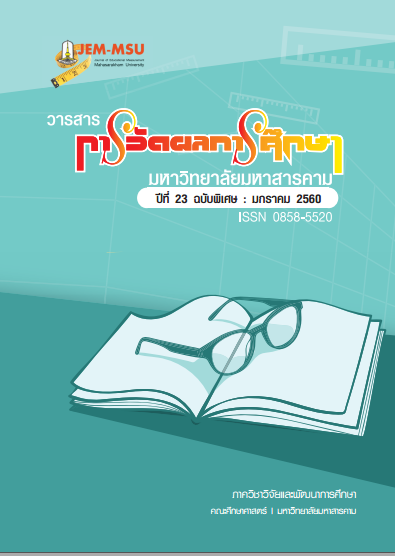The Comparisons of Academic Comparisons of Reading Comprehension, Vocabulary Writing and Achievement Motivation in English Language of Prathomsuksa 5 students Between Using Brain–Based Learning Approach and SQ4R Learning Approach
Main Article Content
Abstract
The purpose of this study were 1) to study the plans efficiency of Brain-Based
Learning and SQ4R Learning Approach in English Language Subject for Prathomsuksa 5, with
a required efficiency of 75/75, 2) to find out effectiveness indices of these to developed
learning plans, and 3) to compare reading comprehension, vocabulary writing, and achievement
motivation of the students between the two mentioned approach. The sample used in this
study consisted of 33 and 30 Prathomsuksa 5 students attending Nongwang school and
Koob school, Narm-kliang District, Sisaket Primary Education Service Area Zone 1, obtained
using the cluster random sampling technique. The instruments used for the study were 1)
two types of plans for brain-based learning and SQ4R learning approach, 8 plans each, for 2
hours per plan ; 2) a 30 – item reading comprehension test with discriminating power ranging
0.26 – 0.81, and a reliability of 0.82 ; 3) a 30 – item vocabulary writing test with difficulties
ranging 0.28 – 0.57, discriminating power ranging 0.21 – 0.68, and a reliability of 0.80 ; 4) a 20
– item scale of achievement motivation with discriminating power ranging 0.33 – 0.77, and a
reliability of 0.86. The statistics used for analyzing data were mean, standard deviation,
percentage, and F - test (One – way MANOVA) were employed for testing hypotheses.
The results of the study were as follows :
1. The plans for organization of brain – based learning and SQ4R learning
approaches had efficiencies of 78.64/77.88 and 78.48/76.11 resprctively.
2. The plans for organization of brain – based learning and SQ4R learning
approaches had the effectiveness indices of .6606 and .5987 respectively.
3. The student who learned using of brain - based learning approach showed
higher reading comprehension, vocabulary writing, and achievement motivation than who
learned using SQ4R learning approach (p ‹ .01).
Article Details
The content and information contained in the published article in the Journal of Educational Measurement Mahasarakham University represent the opinions and responsibilities of the authors directly. The editorial board of the journal is not necessarily in agreement with or responsible for any of the content.
The articles, data, content, images, etc. that have been published in the Journal of Educational Measurement Mahasarakham University are copyrighted by the journal. If any individual or organization wishes to reproduce or perform any actions involving the entirety or any part of the content, they must obtain written permission from the Journal of Educational Measurement Mahasarakham University.


